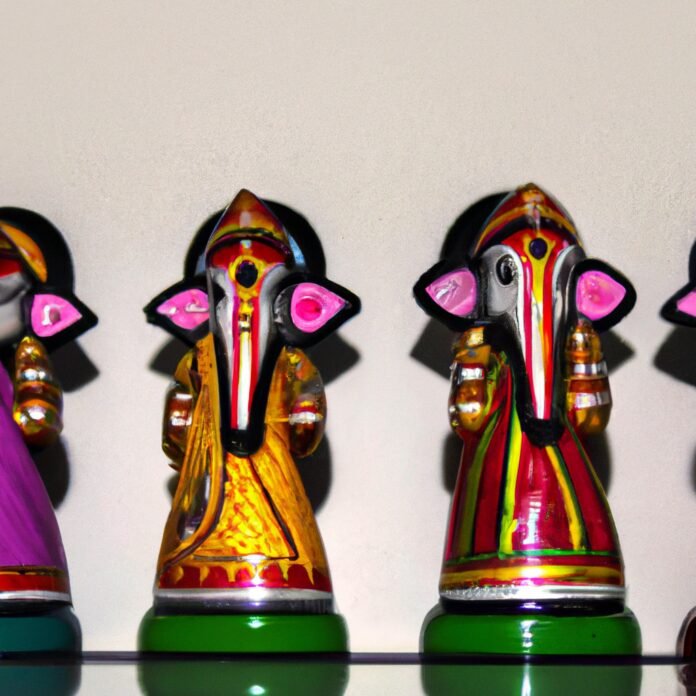Nostalgia is defined as “a wistful desire to return in thought or in fact to a former time in one’s life”. For many, there is no greater emotion than the feeling of returning to the rich culture of their homeland. And this is exactly why celebrating cultural heritage has become so important in our increasingly globalised world. Celebrating the past helps to keep our identity alive and brings us closer to the people and places we love. Through this article, we will explore ways in which we can keep our cultural heritage alive and honour the many histories that make up our world.
1. Rediscovering Our Roots: Celebrating Cultural Heritage Ahead
With 2020 coming to a close, it’s time to reconsider how we look back and celebrate our cultural heritage. From our ancestors to just last summer, it is an integral part of our identity, uniqueness, resilience, and success.
- Reconnect With History – While the past can’t be changed, we can recognize our interconnectedness with it, and have a better understanding of its legacy. Rediscovering our history is an effective way to dive deeper into our lineage and put current issues into greater perspective. Examine and appreciate the long winding history that has played a crucial role in our present lives. It can be more meaningful than simply knowing the facts and figuring out the story through highlights of the timeline.
- Explore New Identities – It’s important to ask ourselves questions about our past and celebrate the diversity of cultures that make us who we are. From language, music, and architecture to food and fashion, there is an abundance of cultural identities that exist in today’s globalized world. Explore the various facets of these identities to better understand who we are and the different influences that have made us who we are.
- Experience Festivals and Celebrations – Take the time to attend local festivals and celebrations. Explore the festivities and revel in the diversity of cultures on display. Learn about traditional customs and stories, participate in folk dances, and savor the flavors of exotic dishes. Fully immerse yourself in the cultural environment, as it’s the best way to truly appreciate this vibrant celebration of heritage.
- Preserve, Respect, and Celebrate – We should prioritize the preservation of our culture and traditions from the past. Dig into archives and trace back to the roots, and continue to share the values that are entwined in our lives today. Find ways to respect and honor our cultural heritage with an open heart and mind, and celebrate this important part of our shared histories.
It can be a daunting endeavor to discover and celebrate our roots, but it’s also essential in recognizing our true cultural identities. Rediscovering our roots and heritage provides us with a deeper understanding of our history and culture, and builds meaningful connections with our ancestors that last beyond time itself.
2. Appreciating Our Cultural Diversity: An Opportunity to Unite
In a world filled with a vast array of cultures, it can sometimes be hard to bridge the gaps between them. But instead of looking at them as points of contention, what if we use cultural diversity as an opportunity to unite? With understanding, empathy, and mutual appreciation, diverse cultures can become a source of strength instead of division.
Creating Opportunities for Open Discussion. People from different countries and cultures can bring with them fresh perspectives, providing key insights on issues. Opening dialogue between cultural groups can offer a unique opportunity to learn from one another. Forge relationships that celebrated cultural diversity and bridge potential language gaps. Valuing the unique cultural backgrounds in our environment can present exciting opportunities for collaboration.
Empowerment Through Education. Education of different cultures and languages can create an environment of equal understanding and respect. When all members of society have access to knowledge of different cultures, unnecessary stereotypes can be put to rest, and true appreciation of the diversity of our world can come to fruition.
- Encourage unbiased social interactions in the community
- Teach respect and understanding on a global scale
- Support cultural-related activities and social events
- Create inclusive networks to combat prejudice
Functional Benefits of Intercultural Cooperation. Integrating cultural diversity can also hold practical advantages in today’s world. For aspiring entrepreneurs, understanding of different cultural backgrounds can be a gateway to a broader international market. Businesses on the rise can benefit from the input of diverse cultures and identities, offering unique strategies and insights. Companies can expand their horizons even further by retaining foreign talents that come with their own set of specialized skills and know-how.
Taking Initiative to Celebrate Cultural Richness. At its core, appreciating cultural diversity means recognizing the uniqueness of others and the value they offer society. Taking initiative to celebrate cultural richness can make a real and tangible impact. Everyone, no matter their background, can take meaningful steps to honor the world around them. Simply reach out and start the conversation—it could lead to beautiful collaborations and a more unified future.
3. Honoring Our Ancestors: The Legacy of Our Heritage
Our ancestors represent the stories, values, and memories that hold our families and our nations together. We owe our heritage to our ancestors who opened the door to us, inspiring us to seek life with courage and integrity. To honor our ancestors, we should remember and pass on the legacy of who we are:
- Recognize History: Acknowledge the original people and cultures that have made and shaped our world. It is important to understand the story of our ancestors and the impact they had on the world around us.
- Cherish Traditions: Our ancestors have passed down stories and traditions that hold profound wisdom. Engaging with these traditions, whether through stories, recipes, music, or objects, can help us appreciate our ancestry.
- Preserving Legacy: Our ancestors have left behind an incredible legacy that we can continue to carry with us today. Whether it’s a collection of memorable photos, priceless heirlooms, or simply warm memories, honoring our ancestors gives us strength and hope.
By honoring our ancestors, we can stay connected to our family and learn from the wisdom and knowledge of our heritage. Doing so will enrich our lives and pass on a richer legacy to future generations. We owe it to our ancestors to respect and share their stories, traditions, and legacies.
Today, we can honor our ancestors and their legacy by sharing our own stories and traditions. By retaining our family’s truths, habits and values, we can create a lasting legacy that spans generations. Let us use our experiences to create a bridge to the past, to honor our ancestors, and to ensure that their legacy remains intact.
4. Embracing Our Cultural Heritage: A Step Toward Unity
Marching together, no matter what part of the world we are from, our cultural heritage is an essential bond, one which must be embraced if we are to take effective steps toward true unity. Here, we will explore four ways to undertake this endeavor.
1. Embrace Our Roots
From the samurai code of Japan to the Socratic dialogue of ancient Greece, each of us is born into a unique cultural legacy with its own laws, values, and aesthetics. By understanding our heritage, we can recognize how our history was shaped by our diverse ancestors— and how we, in turn, can shape the future. We can start by simply getting to know our roots: reading literature, visiting landmarks, and immersing ourselves in the customs, stories, and music of our homeland.
2. Celebrate Other Cultures
One of the most profound ways we can embrace our cultural heritage is to also learn about and appreciate other cultures. This doesn’t mean abandoning our own – far from it. After all, any knowledge of the “other” can only deepen our appreciation of ourselves. We can watch traditional dances from faraway lands, taste exotic dishes from other kitchens, or even take a journey to learn first-hand about different lifestyles. As we do so, we build bridges of understanding and acceptance.
3. Speak Respectfully About Culture
As we express our own culture in our homes, places of worship, or communities, and while interacting with others, it is essential to speak respectfully about the cultures of others. Be mindful of the words we choose to express our views, as well as the actions we take. Even casual, seemingly insignificant statements can cause deep misunderstandings. So, instead of fueling divisive conversations, let’s make sure we don’t perpetuate stereotypes or play into the hands of those who wish to sow the seeds of hatred.
4. Share Our Heritage
- Invite friends to celebrations: Large or small, cultural events like communal meals, fairs, and festivals bring joy to everyone involved and provide opportunities to learn about the cultural history of our local community.
- Participate in cultural activities: Take part in the vibrant cultural life of our cities and local areas by attending activities that go beyond our own culture and celebrate the diversity of our shared heritage.
- Encourage younger generations: Take time to talk to the youth of your community, whether they’re related or not. Explain why it’s important to learn about and respect the cultural heritage of others.
In today’s complex and interconnected world, acknowledging and embracing our heritage is an essential cornerstone of lasting unity. Let’s never forget our history, and be sure to pass along traditions and values that come to us from all around the world.
As we celebrate our cultural heritage, let us use this special time to come together and honor the many unique traditions of our past. Let us take a moment to recognize one another’s accomplishments, treat one another with respect, and recognize our strengths as communities. No matter our race, gender, culture, or nationality, we are united in our shared culture, and that is something truly worth celebrating.
